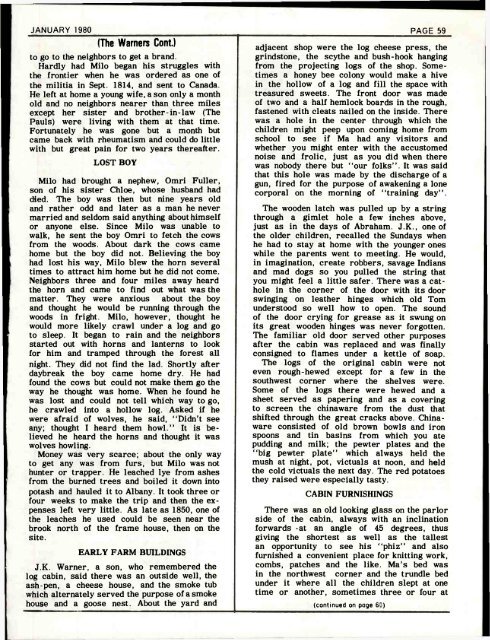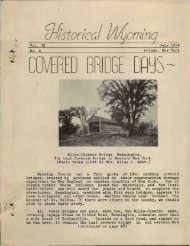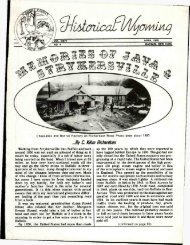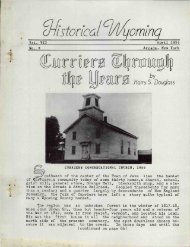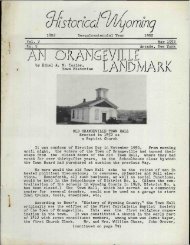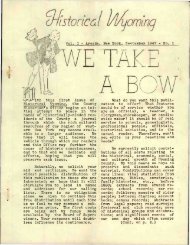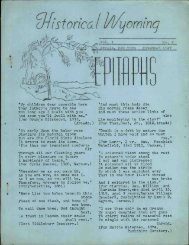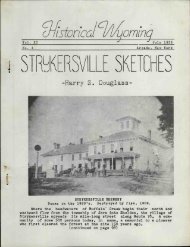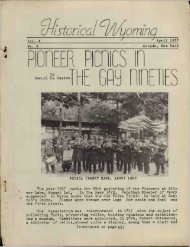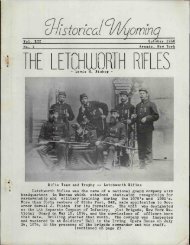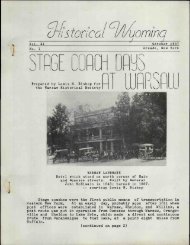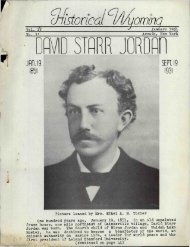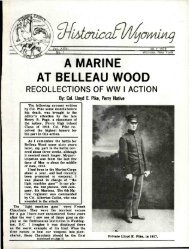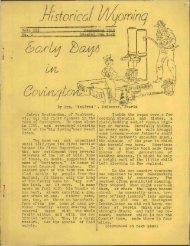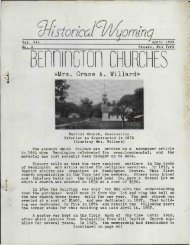Historical Wyoming County Jan 1980 - Old Fulton History
Historical Wyoming County Jan 1980 - Old Fulton History
Historical Wyoming County Jan 1980 - Old Fulton History
Create successful ePaper yourself
Turn your PDF publications into a flip-book with our unique Google optimized e-Paper software.
JANUARY <strong>1980</strong> PAGE 59<br />
(The Warners Cont.)<br />
to go to the neighbors to get a brand.<br />
Hardly had Milo began his struggles with<br />
the frontier when he was ordered as one of<br />
the militia in Sept. 1814, and sent to Canada.<br />
He left at home a young wife, a son only a month<br />
old and no neighbors nearer than three miles<br />
except her sister and brother-in-law (The<br />
Pauls) were living with them at that time.<br />
Fortunately he was gone but a month but<br />
came back with rheumatism and could do little<br />
with but great pain for two years thereafter.<br />
LOST BOY<br />
Milo had brought a nephew, Omri Fuller,<br />
son of his sister Chloe, whose husband had<br />
died. The boy was then but nine years old<br />
and rather odd and later as a man he never<br />
married and seldom said anything about himself<br />
or anyone else. Since Milo was unable to<br />
walk, he sent the boy Omri to fetch the cows<br />
from the woods. About dark the cows came<br />
home but the boy did not. Believing the boy<br />
had lost his way, Milo blew the horn several<br />
times to attract him home but he did not come.<br />
Neighbors three and four miles away heard<br />
the horn and came to find out what was the<br />
matter. They were anxious about the boy<br />
and thought he would be running through the<br />
woods in fright. Milo, however, thought he<br />
would more likely crawl under a log and go<br />
to sleep. It began to rain and the neighbors<br />
started out with horns and lanterns to look<br />
for him and tramped through the forest all<br />
night. They did not find the lad. Shortly after<br />
daybreak the boy came home dry. He had<br />
found the cows but could not make them go the<br />
way he thought was home. When he found he<br />
was lost and could not tell which way to go,<br />
he crawled into a hollow log. Asked if he<br />
were afraid of wolves, he said, "Didn't see<br />
any; thought I heard them howl." It is believed<br />
he heard the horns and thought it was<br />
wolves howling.<br />
Money was very scarce; about the only way<br />
to get any was from furs, but Milo was not<br />
hunter or trapper. He leached lye from ashes<br />
from the burned trees and boiled it down into<br />
potash and hauled it to Albany. It took three or<br />
four weeks to make the trip and then the expenses<br />
left very little. As late as 1850, one of<br />
the leaches he used could be seen near the<br />
brook north of the frame house, then on the<br />
site.<br />
EARLY FARM BUILDINGS<br />
J.K. Warner, a son, who remembered the<br />
log cabin, said there was an outside well, the<br />
ash-pen, a cheese house, and the smoke tub<br />
which alternately served the purpose of a smoke<br />
house and a goose nest. About the yard and<br />
adjacent shop were the log cheese press, the<br />
grindstone, the scythe and bush-hook hanging<br />
from the projecting logs of the shop. Sometimes<br />
a honey bee colony would make a hive<br />
in the hollow of a log and fill the space with<br />
treasured sweets. The front door was made<br />
of two and a half hemlock boards in the rough,<br />
fastened with cleats nailed on the inside. There<br />
was a hole in the center through which the<br />
children might peep upon coming home from<br />
school to see if Ma had any visitors and<br />
whether you might enter with the accustomed<br />
noise and frolic, just as you did when there<br />
was nobody there but "our folks". It was said<br />
that this hole was made by the discharge of a<br />
gun, fired for the purpose of awakening a lone<br />
corporal on the morning of "training day".<br />
The wooden latch was pulled up by a string<br />
through a gimlet hole a few inches above,<br />
just as in the days of Abraham. J.K., one of<br />
the older children, recalled the Sundays when<br />
he had to stay at home with the younger ones<br />
while the parents went to meeting. He would,<br />
in imagination, create robbers, savage Indians<br />
and mad dogs so you pulled the string that<br />
you might feel a little safer. There was a cathole<br />
in the corner of the door with its door<br />
swinging on leather hinges which old Tom<br />
understood so well how to open. The sound<br />
of the door crying for grease as it swung on<br />
its great wooden hinges was never forgotten.<br />
The familiar old door served other purposes<br />
after the cabin was replaced and was finally<br />
consigned to flames under a kettle of soap.<br />
The logs of the original cabin were not<br />
even rough-hewed except for a few in the<br />
southwest corner where the shelves were.<br />
Some of the logs there were hewed and a<br />
sheet served as papering and as a covering<br />
to screen the chinaware from the dust that<br />
shifted through the great cracks above. Chinaware<br />
consisted of old brown bowls and iron<br />
spoons and tin basins from which you ate<br />
pudding and milk; the pewter plates and the<br />
"big pewter plate" which always held the<br />
mush at night, pot, victuals at noon, and held<br />
the cold victuals the next day. The red potatoes<br />
they raised were especially tasty.<br />
CABIN FURNISHINGS<br />
There was an old looking glass on the parlor<br />
side of the cabin, always with an inclination<br />
forwards -at an angle of 45 degrees, thus<br />
giving the shortest as well as the tallest<br />
an opportunity to see his "phiz" and also<br />
furnished a convenient place for knitting work,<br />
combs, patches and the like. Ma's bed was<br />
in the northwest corner and the trundle bed<br />
under it where all the children slept at one<br />
time or another, sometimes three or four at<br />
(continued on page 68)


